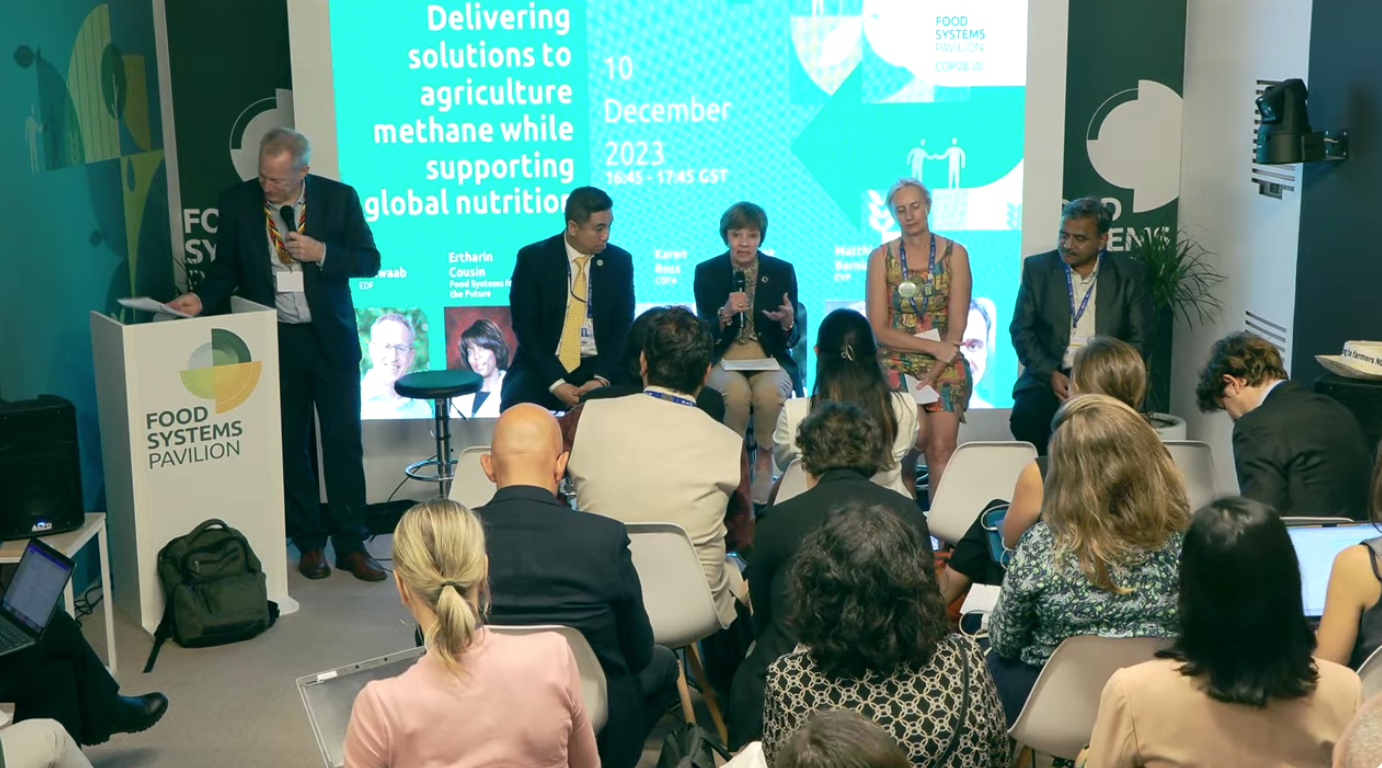
Delivering solutions to agriculture methane while supporting global nutrition – 10 Dec
Core message
Event Summary
Reducing methane emissions from agriculture is vital to combat climate change, yet improper approaches may heighten global malnutrition. Methane, a significant climate change driver, demands attention, as agriculture contributes 40% of human-induced emissions, primarily from livestock and rice systems. Balancing emission reduction with sustaining nutritional contributions from livestock and rice is crucial, emphasizing the need for solutions that support both emission reduction and global nutrition while assisting farmers.
‘Taking immediate action on methane is the most important thing we can do in the short-term to buy us time for addressing the long-term CO2 challenges.’ - Eric Schwaab, Senior Vice President, People and Nature, Environmental Defense Fund
On 10 December, the session, ‘Delivering solutions to agriculture methane while supporting global nutrition’ at the Food Systems Pavilion tackled this challenge. The event delved into the critical role of mitigating methane emissions from agriculture to combat climate change while addressing the global challenge of malnutrition. The discussion emphasized the urgency of acting on methane reduction for immediate climate benefits. Prominent insights highlighted the idea that methane is not an unavoidable price for food security, challenging the perception of a trade-off between reducing emissions and ensuring access to food. Case studies from panelists highlighted successful approaches, such as California's investment in dairy farms and India's adoption of biogas digesters. The event called for coordinated efforts to ensure reduced emissions, improved nutrition and sustainable agriculture.
Key Takeaways
-
There is an urgent need to promptly address methane emissions as a short-term strategy to alleviate the impact of climate change and buy time for tackling long-term CO2 challenges.
-
To effectively address the challenges of greenhouse gas reduction and methane, intricately linked to protein production, the pathway forward must also guarantee access to protein for the most vulnerable population. Without this dual focus, garnering support from countries for the inclusion of greenhouse gas reduction in their action plans will be hindered.
-
A call was made for cost-effective measurement, reporting, and verification systems, supported by regulatory measures, to establish baselines, track progress, and attract climate financing capital.
‘By 2030, we must demonstrate that livestock not only exhibits reduced environmental impact but also achieves enhanced productivity.’ - Thanawat Tiensin, Director Animal Productivity and Health, FAO
-
It is paramount to integrate climate adaptation with efforts to mitigate livestock emissions, acknowledging diverse starting points and proposing solutions such as biogas digesters, genetic resources adaptation, and tenure solutions for pastoralists.
'When it comes to pastoralist systems, the starting point is different. Any steps to mitigate livestock emissions in pastoral systems need to go hand-in-hand with climate adaptation.’ - Fiona Flintan, Senior Scientist, ILRI
Looking Forward
To address greenhouse gas challenges, especially methane from protein production, prioritizing pathways to ensure protein access for vulnerable populations is critical. This consideration is vital for garnering country support in integrating greenhouse gas reduction into action plans. Comprehensive systems with tangible examples need to be established by the next COP, to drive action plan inclusion and to secure increased financing. The disjointed approach so far emphasizes the urgent need for well-documented case studies to substantiate and guide coordinated action.
‘Transitions that fundamentally alter practices require substantial investment; that is why the discussions on financing at COP are so important.’ - Karen Ross, Secretary, California Department of Food and Agriculture
Watch a recording of the full session here.